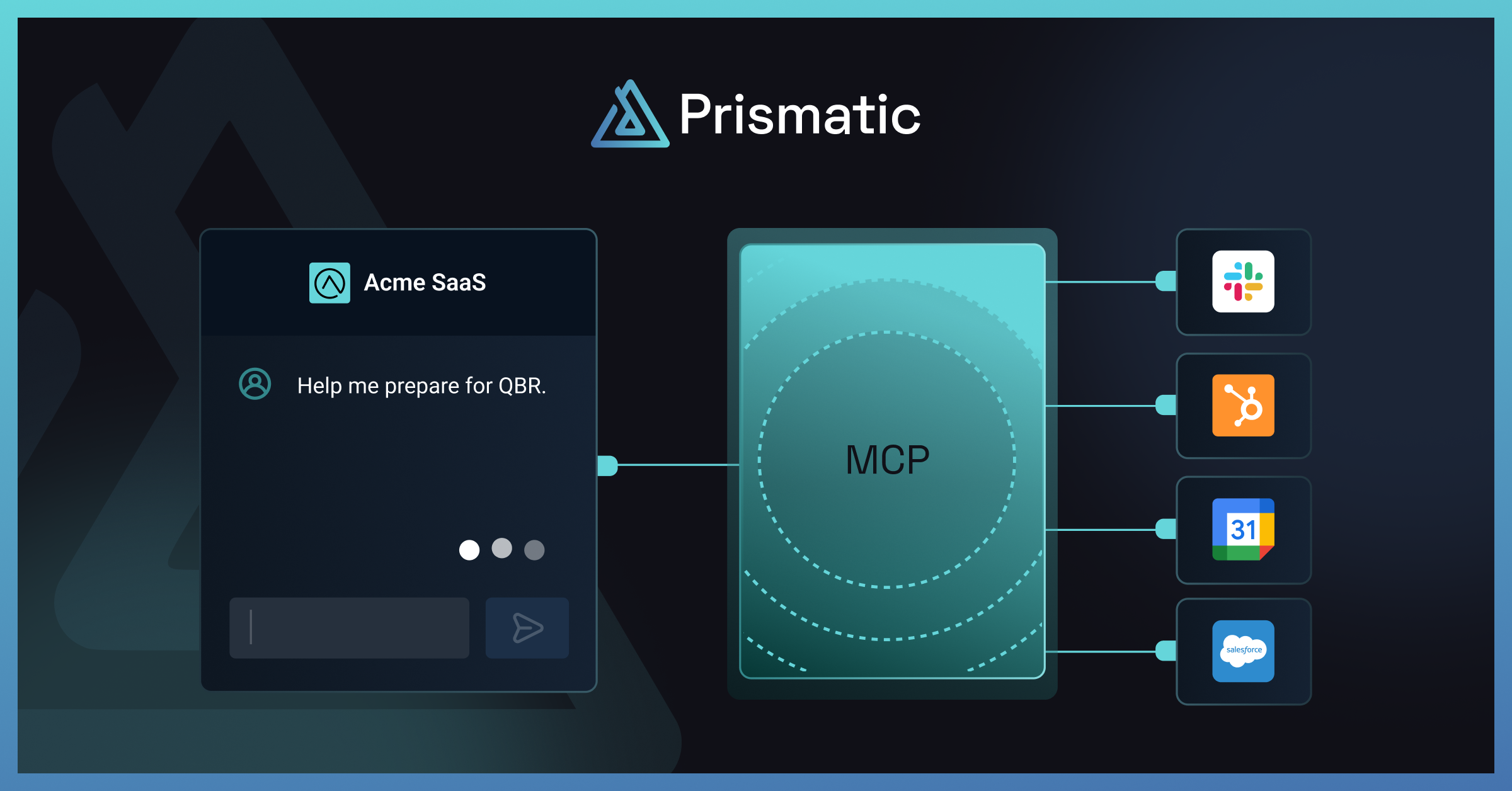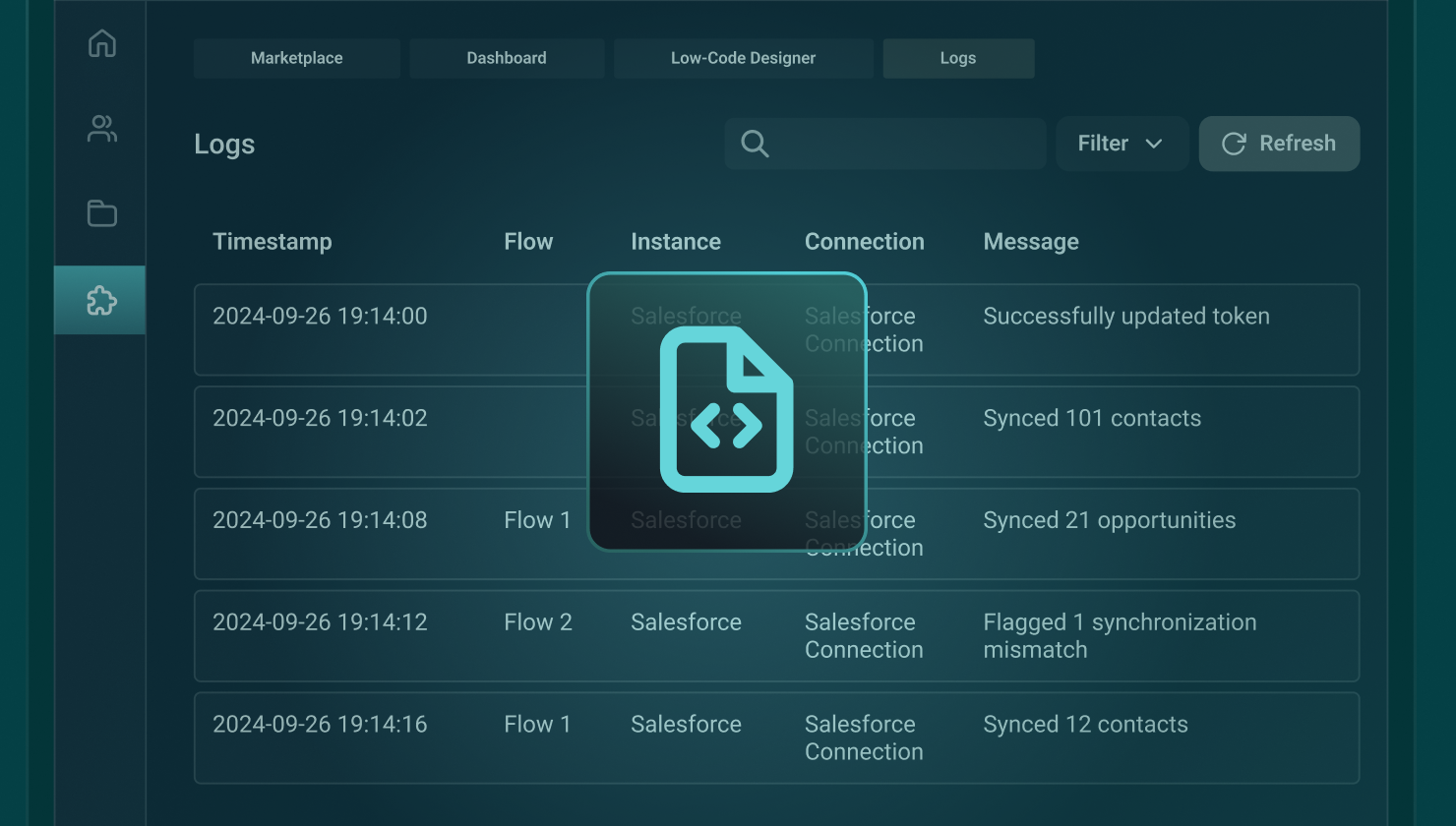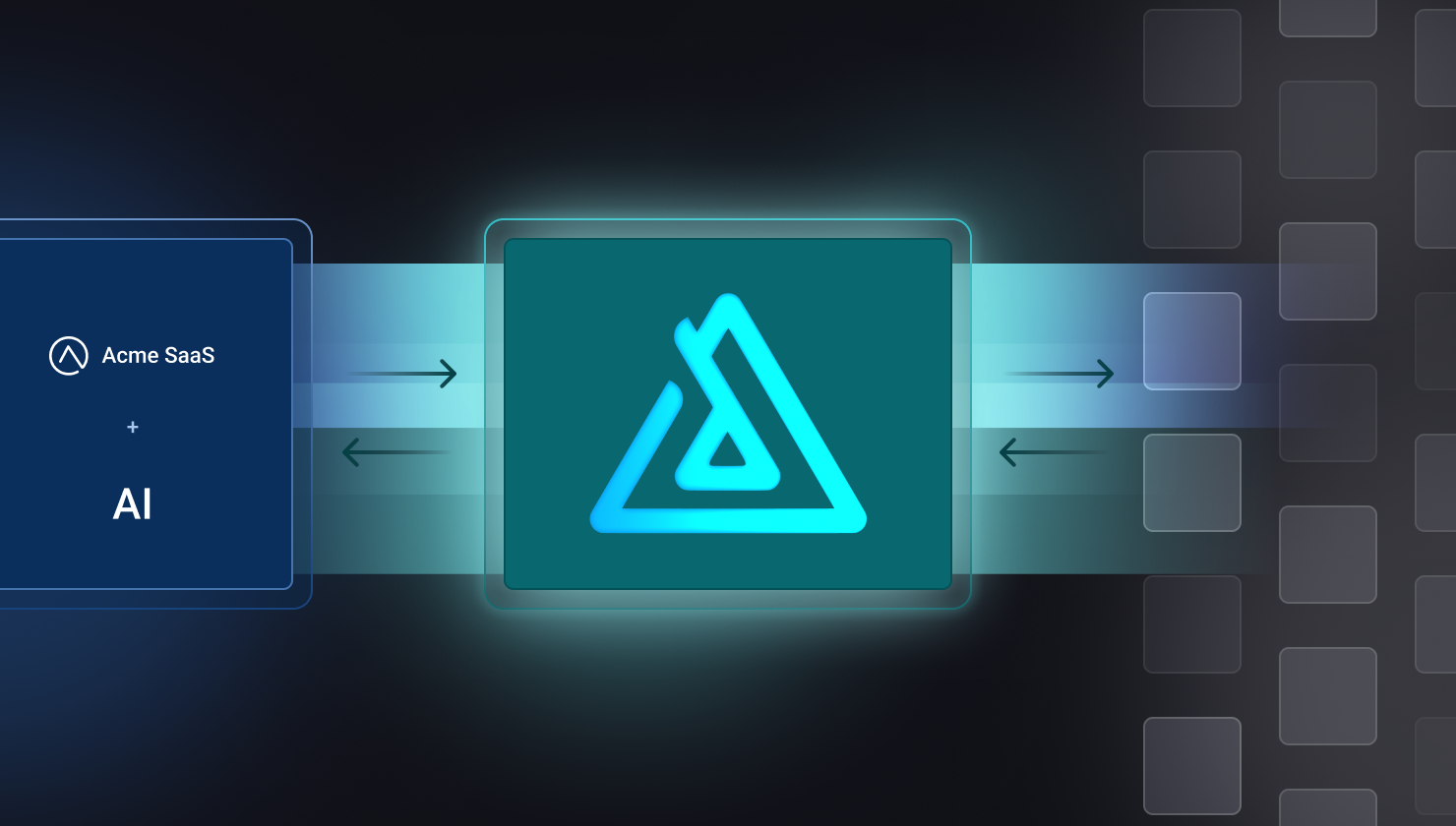AI agents are everywhere. They're writing code, analyzing data, and automating workflows. But here's the problem: when it comes to real-world integrations, most AI implementations are still playing "20 Questions" with APIs, making dozens of individual calls, hoping the LLM gets it right. This is especially problematic for B2B software companies trying to build AI features into their product. Your customers expect reliable, production-grade integrations, not fragile experiments.
Today, we're announcing general availability of the Prismatic MCP flow server, a new way to give your AI agents access to structured, deterministic integration flows. Instead of exposing raw API endpoints and crossing your fingers, you define precisely what should happen, and let Prismatic handle the rest.
The problem with AI + integrations today
Here's what typically happens when teams try to connect AI agents to integrations:
- They expose individual API endpoints as MCP tools.
- The AI agent makes multiple calls, trying to piece together the right sequence.
- Each call relies on fragile prompts and the LLM's interpretation.
- Authentication fails, rate limits hit, errors cascade.
- What should be a simple workflow becomes an unreliable mess.
Without proper guardrails, a hallucinating AI with direct API access could update wrong records, leak sensitive data, or trigger unintended changes. That's why most teams keep AI agents in read-only sandbox mode so they remain experimental toys rather than trusted enterprise tools.
A better way: MCP flow server
The Prismatic MCP flow server takes a fundamentally different approach. Instead of exposing granular actions, you expose complete flows – structured, tested, production-ready workflows that handle:
- Authentication: OAuth, API keys, and customer-specific credentials
- Sequencing: The exact order of operations, every time
- Error handling: Retries, fallbacks, and proper error messages
- Rate limiting: Automatic throttling and queue management
- Data transformation: Convert between formats without prompt engineering
- Monitoring: Full observability into what's happening
Whether you build integrations with TypeScript using code-native integrations or through the low-code designer, the MCP flow server gives your AI agents access to production-ready workflows. Developers can write integration logic in their IDE with full type safety, while the platform handles deployment, authentication, and monitoring across all your customers.
How it works
With the new MCP UI in our integration designer, you can:
- Define agent flows: Create structured workflows that describe exactly what should happen.
- Enable as MCP tools: Toggle which flows should be available to AI agents.
- Connect your Agents: Use the custom MCP endpoint URL to connect Claude, Cursor, or any other MCP-compatible tool.
- Let AI orchestrate: Your agents make a single call to trigger the entire flow.
Here's what this looks like in practice
Here's how this simplifies integration development. Whether you're building flows in TypeScript or the designer, your AI agents interact the same way:
Without the Prismatic MCP flow server
12345678910
With the Prismatic MCP flow server
123
The difference? One is a hopeful experiment. The other is production-ready infrastructure.
Real-world use cases
B2B software companies are using the MCP flow server to deliver AI-powered integration features to their customers:
Customer success automation
- Your customers' AI agents that automatically sync support tickets to customer CRMs
- Intelligent escalation workflows based on end-user context
- Automated follow-ups with personalized action items directly in your product
Sales intelligence
- Customer facing lead enrichment flows that gather data from multiple sources
- Automated proposal generation with real-time pricing embedded in your application
- Deal room synchronization across tools for your end users
Data synchronization
- Multi-system record updates triggered by natural language
- Intelligent data mapping and transformation
- Automated reconciliation workflows
Built on Prismatic's purpose-built infrastructure
When you're embedding AI-powered integrations into your product, your customers expect the same reliability and scale they get from the rest of your platform. This isn't just another MCP implementation. The Prismatic MCP flow server is built on the same infrastructure that powers integrations for Fortune 500 companies:
- Multi-tenant by design: Each customer gets isolated flows.
- Enterprise security: SOC 2 Type II certified and HIPAA compliant.
- Global availability: Deploy in multiple regions worldwide, not limited to US-only infrastructure
- Scalable architecture: Handles millions of executions.
- Full observability: Debug and monitor every execution.
- Version control: Roll back flows without breaking agents.
Two ways to use MCP with Prismatic
The MCP flow server is part of our complete AI toolkit for integrations:
1. Build integrations faster with AI assistance
Your developers can use AI coding agents like Claude and Cursor to build integrations faster. Write TypeScript in your IDE with full type safety while AI helps generate components and logic. This is a development tool that accelerates how your team builds.
2. Deploy integrations as AI-accessible tools
Once built (whether with code-native or low-code), expose your integrations as MCP tools that your customers' AI agents can call. This is the production feature being announced today - giving end users secure, structured access to your integration workflows with enterprise-grade infrastructure.
Note: We recently announced our code-native development updates, including the Prism MCP dev server, VS Code extension, and other tools that make building integrations faster than ever.
Get started
The MCP flow server is available now for all Prismatic customers. Here's how to get started:
- Build or select an integration: Whether you've built with code-native TypeScript or the low-code designer, navigate to your integration in Prismatic.
- Define invocation schema: Declare what parameters your flows accept (eg, firstName, lastName). Only flows with an invocation schema become "agent flows" that AI can properly invoke.
- Click the MCP tab: See all available agent flows and their configuration.
- Enable flows: Toggle which flows should be exposed as MCP tools.
- Connect your agent: Copy the endpoint URL and add it to your AI agent configuration.
- Start building: Your AI agents now have access to production-ready integration flows.
Check out our MCP documentation and the connecting AI agents guide for detailed setup instructions.
The future of AI-powered integrations
AI and integrations are better together, but only when you have the proper infrastructure. The MCP flow server represents our vision for that future: AI agents that can reliably interact with the real world, backed by enterprise-grade integration infrastructure.
This is just the beginning. We're continuing to improve and expand our AI capabilities. Have questions or suggestions? Reach out to us – we'd love to hear from you.
Why this matters
For B2B software companies, integrations are no longer just about moving data between systems. They're about delivering intelligent automation directly to your customers as a core feature of your product. But without proper infrastructure, AI-powered integrations remain unreliable demos rather than production features you can confidently ship to customers.
Prismatic handles everything that breaks at scale: authentication, monitoring, scaling, and security. Now, with the MCP flow server, we're extending that infrastructure to AI agents.
The result? You can finally trust AI with your integrations.
Start building today
Ready to give your AI agents production-ready integration capabilities? The MCP flow server is available now for all Prismatic customers.
Get started with MCP flow server →
Questions or feedback? We want to hear from you. Join our developer community or contact your account team to share your experience and help shape the future of Prismatic's AI capabilities.




